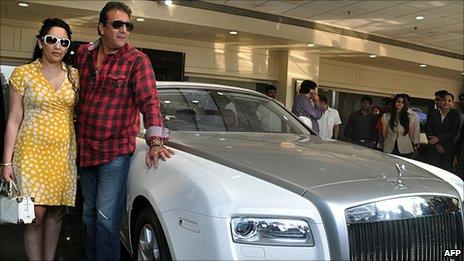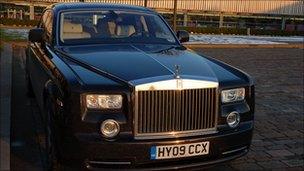Rolls-Royce sales surge 'set to continue', carmaker's chief says
- Published

The Ghost has become popular in Asia with both men and women and this has sent Rolls-Royce sales soaring
Ultra-luxurious brands such as Rolls-Royce will always face one particular challenge: how to promote its cars' "waftability" during a downturn without making its owners look lofty and aloof.
It turns out its latest £165,000 Ghost model - which is smaller and less ostentatious than the £235,000 Phantom models - has provided the answer.
During a year when the rest of the world's carmakers were fighting for customers as they tightened their belts, the UK's Rolls-Royce saw sales rise about 150% - and it is all thanks to the Ghost, which now accounts for about three out of four cars the company sells.
Even in the US, sales were up 220% during the year - yet, the carmaker's chief executive, Torsten Muller-Otvos, describes the North American market as weak.
"The US is still fragile," he laments in an interview with BBC News.
"It is not that people don't have money; not at all. It is a question of whether consumer sentiment is right, whether confidence is right, whether it feels right to go for a super luxury brand."

The larger, more formal Phantom models still sell in relatively low numbers
With such sales surges in a fragile market, it is clear that Rolls-Royce is still gunning for growth - well beyond current levels of about 2,500 cars per year.
Mr Muller-Otvos is convinced this can be done without diluting the brand's exclusive feel.
"The number of cars is so low, it is a drop in a big sea of cars," he says.
"So even if volume doubled, the cars would still be rare."
To help fuel the fire, Rolls-Royce is planning to further expand its model range, with a convertible Ghost expected in about three years' time.
Mr Muller-Otvos declines to comment on such speculation, though he confirms that "there'll be a Ghost derivative to come, as that model's been quite popular".
Asian growth
In the future, much of the sales growth will come in Asia, following strong growth in 2010.
"Asia has recovered particularly well," Mr Muller-Otvos says. "We see nice growth in China, India and Australia."
In China, sales surged 800% last year - beating all expectations.
The UK is also strong, having risen about 130% last year, while in the Middle East sales rose 160%.
"Our partners are very confident there, investing in new showrooms in Abu Dhabi, Qatar, Saudi Arabia and Kuwait," Mr Muller-Otvos says.
Wealthy women
To the casual observer, models from carmakers such as Rolls-Royce do not change much over time, though Mr Muller-Otvos insists his customers are acutely aware of where the economic winds are blowing.
So, in response to the prevailing downbeat economic mood, he has seen a "shift from bling to substance".
"Customers don't over-do the wood, the leather or the chrome and they chose more subtle colours inside," he says.
"There's a degree of sobriety."
Rolls-Royce is also appealing to the growing army of wealthy women.
"They love the Ghost," Mr Muller-Otvos says.
"Some 8-10% of our Ghost customers are female in the US, and it is also popular with women in the Middle East and in China."
That is a dramatic change from the recent past when almost all Rolls-Royce customers were men.
"With the Phantom, sales to women are very low," Mr Muller-Otvos says. "We find that 99.9% of the time it is a male decision."
Some of Rolls-Royce's female customers "bespoke the car in a feminine fashion", he observes, but most of them stick to more traditional designs.
"Do you know what they like about the car?" Mr Muller-Otvos asks.
"It's a male brand. It's a masculine car. It's a powerful car."
Diesel and hybrids?
Mr Muller-Otvos is also keeping an eye on the carbon dioxide emissions debate, though for the time being his customers are not demanding better fuel economy.
"But that can change quite quickly," he acknowledges, pointing to how both attitudes and regulation change all the time.
So to be prepared, Rolls-Royce is considering alternative engine solutions.
As a subsidiary of the German carmaker BMW, which these days makes arguably the most efficient diesel engines in the world, Rolls-Royce would be well placed to introduce diesel engines in its cars - though so far its customers have said no to this.
"Our main markets are the US and Asia, neither of them diesel markets," explains Mr Muller-Otvos, while at the same time insisting that diesel engines could easily deliver the right torque for a Rolls-Royce.
Petrol electric hybrid solutions could also work, he reasons.
"We will start to think about that, but first I'll need to find out whether this is acceptable for our customers."
Hence, do not expect Rolls-Royce to be at the cutting edge of innovation in this area.
"If you look at the most successful cars in that segment, they are not unusual, quirky cars," says Mr Muller-Otvos.
"Luxury cars need to have good substance. They must be well engineered. Our customers are buying authenticity at its best."